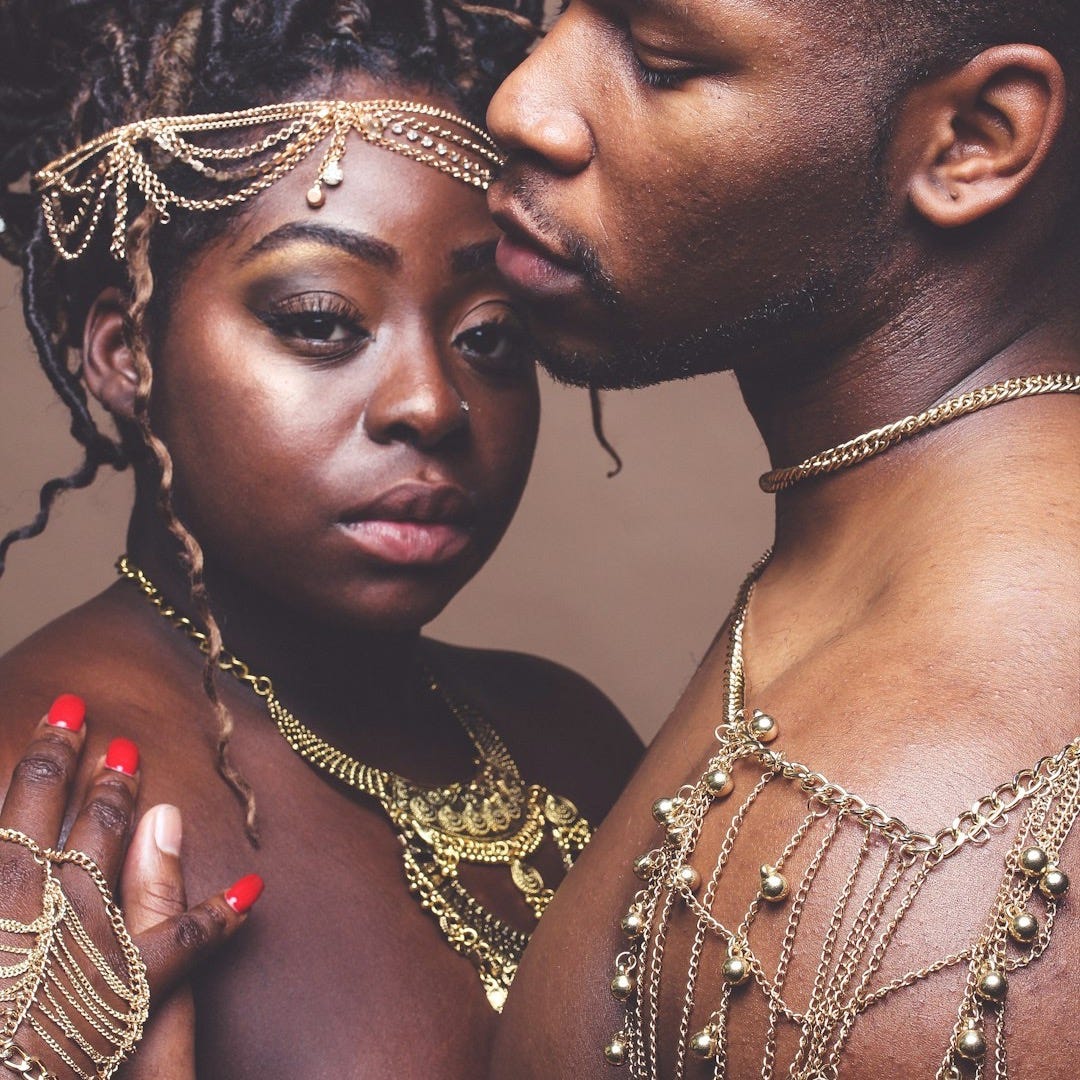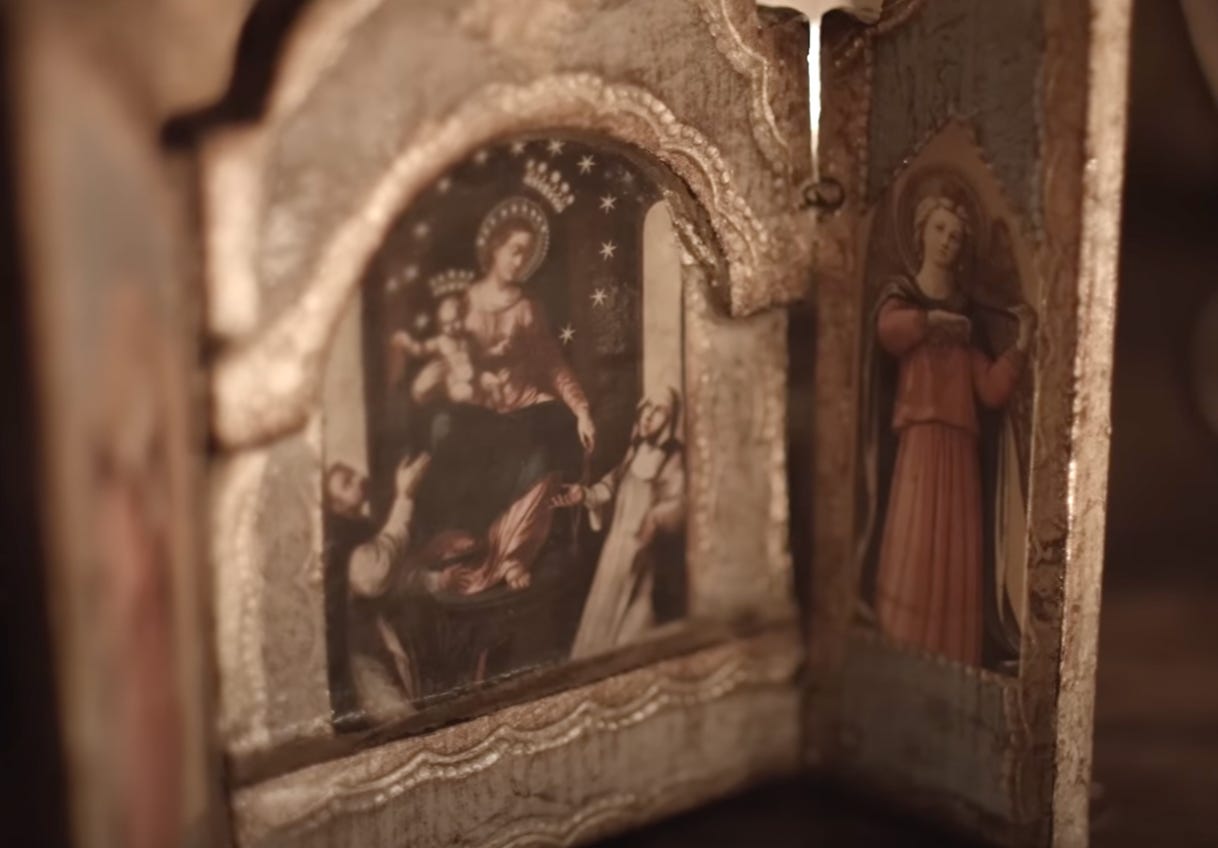
Anchor
[The Woman]
Kiss me and kiss me again,
for your love is sweeter than wine.
How pleasing is your fragrance;
your name is like the spreading fragrance of scented oils.
No wonder all the young women love you!
Take me with you; come, let’s run!
The king has brought me into his bedroom.
[The Man]
You are as exciting, my darling,
as a mare among Pharaoh’s stallions.
How lovely are your cheeks;
your earrings set them afire!
How lovely is your neck,
enhanced by a string of jewels.
We will make for you earrings of gold
and beads of silver.
[The Woman]
The king is lying on his couch,
enchanted by the fragrance of my perfume.
My lover is like a sachet of myrrh
lying between my breasts.
He is like a bouquet of sweet henna blossoms
from the vineyards of En-gedi.
[The Man]
Look at you! How beautiful you are, my darling,
how beautiful!
Your eyes are doves.
[The Woman]
You are so handsome, my love,
pleasing beyond words!
Our couch is green. Soft grass is our bed;
fragrant cedar branches are the beams of our house,
and pleasant smelling firs are the rafters.
I am a spring crocus blooming on the Sharon Plain, a Palestinian rose,
the lily of the valley.
[The Man]
Like a lily among thistles
is my love among young women. — Song of Solomon 1: 2-4; 9-17; 2:1-2
Sea
No one really preaches on Song of Songs, a trend I find so disheartening because it is such beautiful poetry. But for real, be honest. When was the last time you heard a whole series on Song of Solomon? It was 2007/2008 for me—17 years ago. Whatever happened to “all scripture is profitable?”
Just for transparency’s sake, I feel pretty estranged from sexual expression most of the time. Some of that is from the ways I’ve misused it in my past, but some of that is also from the way our theology has left sex in the life of the believer under-explored. There’s more to sexual expression than the limited instructions we’ve been given: sex inside marriage is good, sex outside of marriage is bad, sex between a man and a woman is permissible, and any other pairing is outside God’s design.
Sex is essentially a physical expression of intimacy. It is an exchange of knowledge. As such, it’s a form of communication, but the church equips followers of Jesus with the weakest, most pathetic vocabulary to express ourselves. If we cannot communicate about the way we communicate (and why), then we’re prone to misunderstand one another. Or stop speaking altogether.
The messaging around sex and romance from a secular perspective is so alluring, so articulate, and so pervasive. Yet here believers are, struggling to verbalize (much less experience) a profound theology of sex. And in an age when the question of sex(uality) is at the heart of so many hurts to the body of Christ, are we really going to ignore the one book in scripture that revels in it?
I guess sex is such an incendiary topic that most preachers try to steer clear of it. I remember I was asked to write a three-day devotional series, and I selected two passages from Hosea and one from Song of Solomon. I was talking about the rapturous romantic intimacy with God we experience as believers, and immediately, eyebrows were raised.
When I was asked to perform at a Christian conference, I chose my poem Cab Rides & The Morning After, which talks about sexuality and the time I found God’s conviction and grace at a club in Istanbul grinding on some random Kurdish guy. The folks weren’t sure if my poem was “appropriate” despite it being my testimony centering on repentance. They weren’t even sure I was a Christian when I wrote it. If they had a problem with my relatively tame account, what must they think of the innuendo-laden love poem right in the middle of scripture?
Song of Songs is in the Bible for a reason. The poet probably wrote it for their lover or in honor of love. But since this erotic poem is a part of scripture, it must be viewed as Holy Spirit-inspired, useful for instruction, rebuking, correcting, and training in righteousness. How might it apply to us?
I was reading Dick Eastmen’s devotional Awesome about the names and attributes of Jesus in Scripture. One day included a meditation on Song of Songs 5:16. Deciding to read the entire chapter, I paused at the first verse: “I came to my garden, my sister, my bride.” I thought, wow. That’s not only poetry; that’s pure theology.
What if it’s not the poet but Jesus saying these words to his Bride, the church? Jesus Christ describes the one he loves in three ways: his garden, sister, and bride. This means that Jesus knows me three-fold over. First, I am his beautiful creation and special dwelling place, which he crafted for his enjoyment. Secondly, he considers me his respected co-heir and trusted family member. I enjoy the same relationship he has with our Father. Lastly, he has chosen me as his beautiful covenant partner who he intends to share his life with. His possession marks each relationship. I belong to him in each aspect, but each relationship ascends in intimacy.
Here are a few passages from scripture that attest to how Jesus relates to us and how we are meant to relate to him.
Christ as Creator: John 1:1-5; Colossians 1:15-20; Revelations 22:13
Christ as Brother, Co-heir: Romans 8:14-17; Galatians 3:15-4:7
Christ as Bridegroom: Ephesians 5:22-33; Rev 19:6-9; Revelations 22:16-17; Song of Solomon 5: 10-16
What changes about your relationship with Jesus if you allow him to occupy these roles in your life? What does Jesus desire to share with you in each relationship? What kind of new intimacy does this relationship call for?
Are you comfortable seeing yourself as the garden where Jesus relaxes and delights? How about the brother with whom Christ shares his inheritance, wealth, status, and identity? What changes if you begin to see yourself as the captivating Bride he longs to take in his arms? —Men, this applies to you too.
Today, I’m sitting with the last one. I need to see Jesus as the indefatigable lover of my soul, as the one who daydreams of a future with me. Yes! “Let him kiss me with the kisses of his mouth. For his love is better than wine.”
Sail
I decided to include the motion poem of Cab Rides & The Morning After for this week. This was the poem I was almost barred from performing at the Christian conference. Me and my friends Mark, Elliot, and Dalilah created this in 2016. Mark is the dancer and lead actor. Elliot and Dalilah, who are married, shot and edited the video.
*As the family of God expanded to include Gentiles, the church’s conversations about sex must expand and include queer believers. I don’t have all the answers, but I believe to do otherwise is to betray the grace that grafted me into fellowship with God.
Verily,
Alysia Nicole Harris





Lord—you are the Lover of my soul. May I rest in your everlasting arms with a knowing——that your love endures forever and ever. Amen